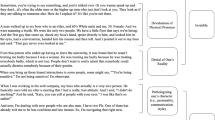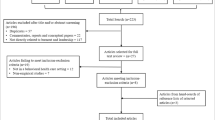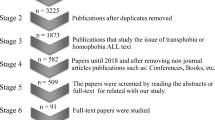Abstract
In this study, we examined perceptions of the citizenship behaviors of male and female employees who took leave to care for a newborn, a sick child, a sick parent, or who did not take leave. In a 2 (employee gender) × 4 (reason for leave) × 2 (participant gender) experimental design, 242 undergraduate students read a mock personnel file and rated the employee on altruism and generalized compliance. Female employees were not rated differently whether they took leave or not. Male employees who took leave for birth or eldercare were rated less likely to be altruistic at work than their male counterparts who did not take leave and their female counterparts who took leave. There was also a bias against male leave takers for generalized compliance ratings, especially by male evaluators. Future research ideas and implications for organizational practice are discussed.
Similar content being viewed by others
REFERENCES
Acker, J. (1990). Hierarchies, jobs, bodies: A theory of gendered organizations. Gender and Society, 4, 139-158.
Allen, T., & Rush, M. (1998). The effects of organizational citizenship behavior on performance judgments: A field study and a laboratory experiment. Journal of Applied Psychology, 83, 247-260.
Allen, T., & Russell, J. (1999). Parental leave of absence: Some not so family-friendly implications. Journal of Applied Social Psychology, 29, 166-191.
Allen, T., Russell, J., & Rush, M. (1994). The effects of gender and leave of absence on attributions for high performance, perceived organizational commitment, and allocation of organizational rewards. Sex Roles, 31, 443-465.
Bachrach, D. G., Bendoly, E., & Podsakoff, P. M. (2001). Attributions of the "causes" of group performance as an alternative explanation of the relationship between organizational citizenship behavior and organizational performance. Journal of Applied Psychology, 86, 1285-1293.
Bentler, P. (1990). Comparative fit indexes in structural models. Psychological Bulletin, 107, 238-246.
Berry, J., & Rao, J. (1997). Balancing employment and fatherhood: A systems perspective. Journal of Family Issues, 18, 386-402.
Borman, W., & Motowidlo, S. (1997). Task performance and contextual performance: The meaning for personnel selection research. Human Performance, 10, 99-109.
Commission on Family and Medical Leave. (1996). A workable balance: A report to congress on family and medical leave policies. Retrieved October 2, 2000, from http://www.dol.gov/dol/esa/public/regs/compliance/whd/fmla/chap5.pdf
Deutsch, F., Lussier, J., & Servis, L. (1993). Husbands at home: Predictors of paternal participation in childcare and housework. Journal of Personality and Social Psychology, 65, 1154-1166.
Eagly, A. (1987). Sex differences in social behavior: A social-role interpretation. Hillsdale, NJ: Erlbaum.
Eby, L. T., Allen, T. D., & Douthitt, S. S. (1999). The role of nonperformance factors on job-related relocation opportunities: A field study and laboratory experiment. Organizational Behavior and Human Decision Processes, 79, 29-55.
Etaugh, C., & Study, G. (1989). Demographic predictors of college students' attitudes toward working mothers. Journal of College Student Development, 30, 465-466.
Family and Medical Leave Act of 1993, Pub. L. No. 103-3. Retrieved October 2, 2000, from http://www.dol.gov/dol/esa/public/regs/statutes/whd/fmla.htm
Galinsky, E., & Stein, P. (1990). The impact of human resource policies on employees: Balancing work/family life. Journal of Family Issues, 11, 368-383.
Gutek, B. A., Searle, S., & Klepa, L. (1991). Rational versus gender role explanations for work-family conflict. Journal of Applied Psychology, 76, 560-568.
Hall, D. (1989, December). Moving beyond the "mommy track": An organization change approach. Personnel, 23-29.
Hui, C., Lam, S. K., & Law, K. S. (2000). Instrumental values of organizational citizenship behavior for promotion: A field quasi-experiment. Journal of Applied Psychology, 85, 822-828.
Hyde, J., Essex, M., & Horton, F. (1993). Fathers and parental leave: Attitudes and experiences. Journal of Family Issues, 14, 616-638.
Israeloff, R. (1995). The truth about paternity leave. Parents, 1, 98-100.
Judiesch, M., & Lyness, K. (1999). Left behind? The impact of leaves of absence on managers' career success. Academy of Management Journal, 42, 641-651.
Kaufman, G. (2000). Do gender role attitudes matter? Family formation and dissolution among traditional and egalitarian men and women. Journal of Family Issues, 21, 128-144.
Kerpelman, J., & Schvanaveldt, P. (1999). Young adults' anticipated identity importance of career, marital, and parental roles: Comparisons of men and women with different balance orientations. Sex Roles, 41, 189-217.
Kidder, D. L., & Parks, J. M. (2001). The good soldier: Who is s(he)? Journal of Organizational Behavior, 22, 939-959.
Kiker, D. S., & Motowidlo, S. J. (1999). Main and interaction effects of task and contextual performance on supervisory reward decisions. Journal of Applied Psychology, 84, 602-609.
Konrad, A., & Hartmann, L. (2001). Gender differences in attitudes toward affirmative action programs in Australia: Effects of beliefs, interests, and attitudes toward women. Sex Roles, 45, 415-432.
Landau, J., & Arthur, M. (1992). The relationship of marital status, spouse's career status, and gender to salary level. Sex Roles, 27, 665-681.
Larbuckle, J. (2002). Amos Graphics (Version 4.01). Chicago, IL: Small Waters Corp.
LePine, J. A., Erez, A., & Johnson, D. E. (2002). The nature and dimensionality of organizational citizenship behavior: A critical review and meta-analysis. Journal of Applied Psychology, 87, 52-65.
Levande, D., Herrick, J., & Sung, K. (2000). Eldercare in the United States and South Korea. Journal of Family Issues, 21, 632-652.
Levine, J. (1997). Working fathers: Balancing work and families. Reading, MA: Addison.
Levine, K. (1993, August). Is today's workplace really family friendly? Parents, pp. 30-34.
Lewis, S. (1996). Rethinking employment: An organizational culture change framework. In S. Lewis & J. Lewis (Eds.), The work-family challenge: Rethinking employment (pp. 1-19). London: Sage.
Lewis, S., & Taylor, K. (1996). Evaluating the impact of family-friendly employer policies: A case study. In S. Lewis & J. Lewis (Eds.), The work-family challenge: Rethinking employment (pp. 112-127). London: Sage.
Lobel, S., & St. Clair, L. (1992). Effects of family responsibilities, gender, and career identity salience on performance outcomes. Academy of Management Journal, 35, 1057-1069.
Lovell, S., Kahn, A., Anton, J., Davidson, A., Dowling, E., Post, D., et al. (1999). Does gender affect the link between organizational citizenship behavior and performance evaluation? Sex Roles, 41, 469-478.
Lyness, K., Thompson, C., Francesco, A., & Judiesch, M. (1999). Work and pregnancy: Individual and organizational factors influencing organizational commitment, timing of maternity leave, and return to work. Sex Roles, 41, 485-508.
MacKenzie, S., Podsakoff, P., & Fetter, R. (1991). Organizational citizenship behavior and objective productivity as determinants of managerial evaluations of salespersons' performance. Organizational Behavior and Human Decision Processes, 50, 123-150.
Miller, A., & Tsiantar, D. (1991, November 25). Mommy tracks. Newsweek, pp. 48-49.
Morris, B. (1997, March 17). Is your family wrecking your career (and vice versa)? Fortune, pp. 71-76, 80, 86, 90.
Motowidlo, S. J. (1986). Information processing in personnel decisions. Research in Personnel and Human Resources Management, 4, 1-44.
Norman, N., & Tedeschi, J. (1984). Paternity leave: The unpopular benefit option. Personnel Administrator, 2, 390-443.
Nunnally, J. (1978). Psychometric theory (2nd ed.). New York: McGraw Hill.
Organ, D. (1988). Organizational citizenship behavior: The good soldier syndrome. Lexington, MA: Lexington Books.
Organ, D., & Ryan, K. (1995). A meta-analytic review of attitudinal and dispositional predictors of organizational citizenship behavior. Personnel Psychology, 48, 775-902.
Orr, J. M., Sackett, P. R., & Mercer, M. (1989). The role of prescribed and nonprescribed behavior in estimating the dollar value of performance. Journal of Applied Psychology, 74(1), 34-42.
Park, O. S., & Sims, H. P., Jr. (1989). Beyond cognition in leadership: Prosocial behavior and affect in managerial judgment. Working paper, Management Department, Seoul National University and Pennsylvania State University.
Podsakoff, P., MacKenzie, J., Paine, J., & Bachrach, D. (2000). Organizational citizenship behaviors: A critical review of the theoretical and empirical literature and suggestions for future research. Journal of Management, 26, 513-563.
Rothausen, T. (1999). "Family" in organizational research: A review and comparison of definitions and measures. Journal of Organizational Behavior, 20, 817-836.
Ruble, T. (1983). Sex stereotypes: Issues of change in the 1970s. Sex Roles, 9, 397-402.
Russo, N. (1976). The motherhood mandate. Journal of Social Issues, 32, 143-153.
Scarr, S., & Eisenberg, M. (1993). Child care research: Issues, perspectives, and results. Annual Review of Psychology, 44, 613-644.
Schneer, J., & Reitman, F. (1990). Effects of employment gaps on the careers of MBA's: More damaging for men than for women? Academy of Management Journal, 33, 391-406.
Smith, C. A., Organ, D., & Near, J. (1983). Organizational citizenship behavior: Its nature and antecedents. Journal of Applied Psychology, 68, 653-663.
Spence, J., Helmreich, R., & Stapp, J. (1975). Ratings of self and peers on sex role attributes and their relation to self-esteem and conceptions of masculinity and femininity. Journal of Personality and Social Psychology, 32, 29-39.
US Census Bureau. (1999). Statistical abstract of the United States: The national data book Washington, DC: Author.
Steiger, J. (1990). Some additional thoughts on components, factors, and factor indeterminacy. Multivariate Behavioral Research, 25, 41-45.
Thompson, C., Beauvais, L., & Lyness, K. (1999). When work-family benefits are not enough: The influence of work-family culture on benefit utilization, organizational attachment, and work-family conflict. Journal of Vocational Behavior, 54, 392-415.
Wagner, D., & Neal, M., (1994). Caregiving and work: Consequences, correlates, and workplace responses. Educational Gerontology, 20, 645-663.
Wells, S. (2000). The elder care gap. HR Magazine, 45, 38-46.
Werner, J. (1994). Dimensions that make a difference: Examining the impact of in-role and extrarole behaviors on supervisory ratings. Journal of Applied Psychology, 79, 98-107.
Author information
Authors and Affiliations
Corresponding author
Rights and permissions
About this article
Cite this article
Wayne, J.H., Cordeiro, B.L. Who Is a Good Organizational Citizen? Social Perception of Male and Female Employees Who Use Family Leave. Sex Roles 49, 233–246 (2003). https://doi.org/10.1023/A:1024600323316
Issue Date:
DOI: https://doi.org/10.1023/A:1024600323316




